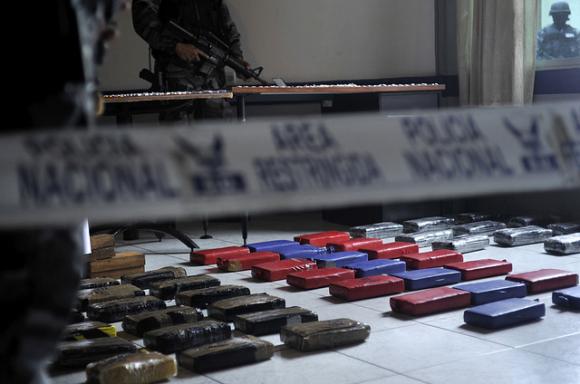The latest arrests of high-ranking police officials point to a troubling pattern of official corruption that could be fueling Ecuador’s status as a drug transit nation.
The most recent case involved the arrest of four police, including a major and a colonel who formerly served as the head of Interpol in Ecuador. The police allegedly facilitated the operations of a criminal group that packed drugs into containers bound for export. The Interior Ministry reported that the case resulted in six other arrests, the seizure of 10 packets of cocaine in Quito and another 35 kilos seized at a local airport.
The previous month, seven police were arrested in two other operations. On September 26, two Ecuadorean police were arrested for alleged ties to an organization, while another 250 kilos of Europe-bound cocaine was seized. And in mid-September, five police were arrested for facilitating the passage of cocaine through Quito’s international airport, allegedly charging up to $4,000 for each kilo safely sent out, according to the national police.
There have now been a total of six cases involving police officials arrested for drug trafficking since 2011, reported El Comercio. Amid concerns over illicit police activity, 557 police were purged from the force between June 2013 and September 2014 for crimes including drug trafficking, according to El Comercio.
InSight Crime Analysis
The fact that the cases mentioned involve a number of high-ranking police officers is worrying for Ecuador and also suggests the arrests could be just the tip of the iceberg — a dangerous proposition for a country already vulnerable to the influence of the drug trade.
SEE ALSO: Coverage of Ecuador
The country’s role as a drug transshipment point appears to be growing, with cocaine seizures rising from 14.8 tons in 2010 — two years after President Rafael Correa decided to close a US air base in Manta used to combat drug trafficking — to 42.5 tons in 2013, and there also are signs the domestic drug market is expanding. In addition, there is evidence that drug traffickers are not only moving product but using the country as a logistical hub, especially Colombian criminal networks, who have already moved into the country to control drug routes and even micro-trafficking.
As seen elsewhere in countries such as Bolivia, an easily corruptible police force is one of the main attractions for migrating criminal networks looking to expand their operations or escape the attentions of security forces back home, and police collusion as in the recent cases will only further encourage organized crime to set up shop in Ecuador.

